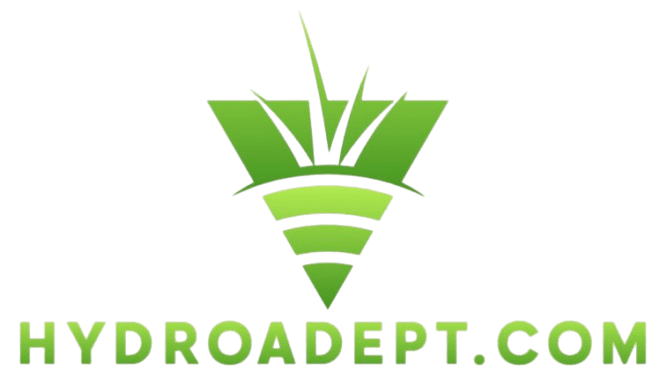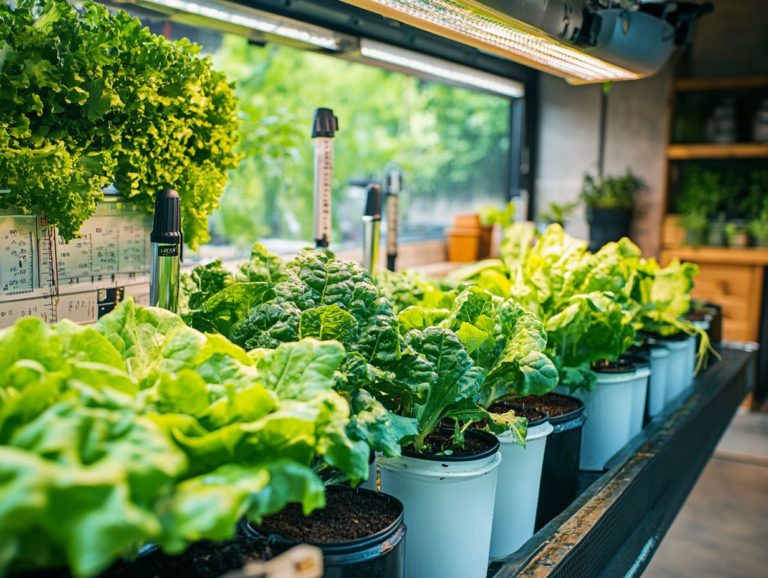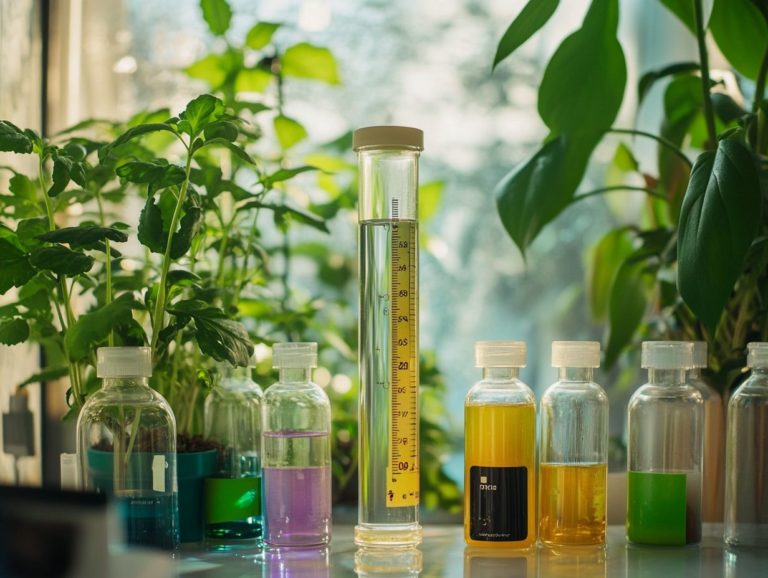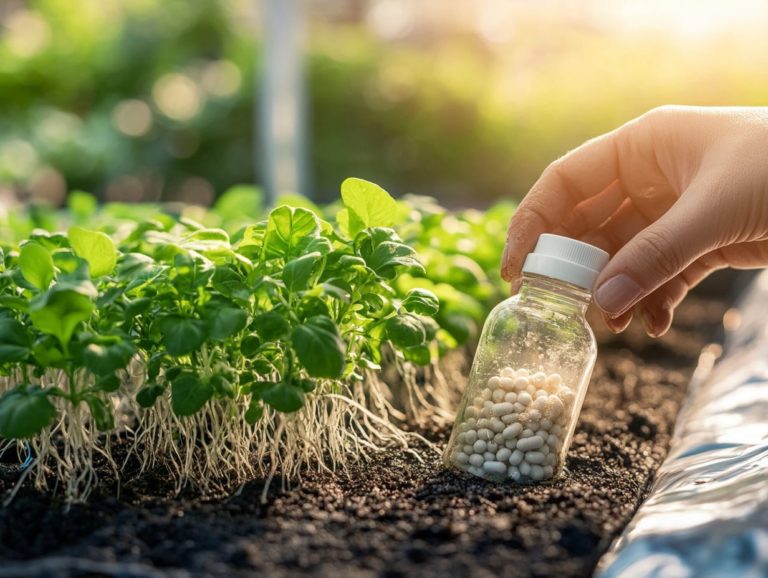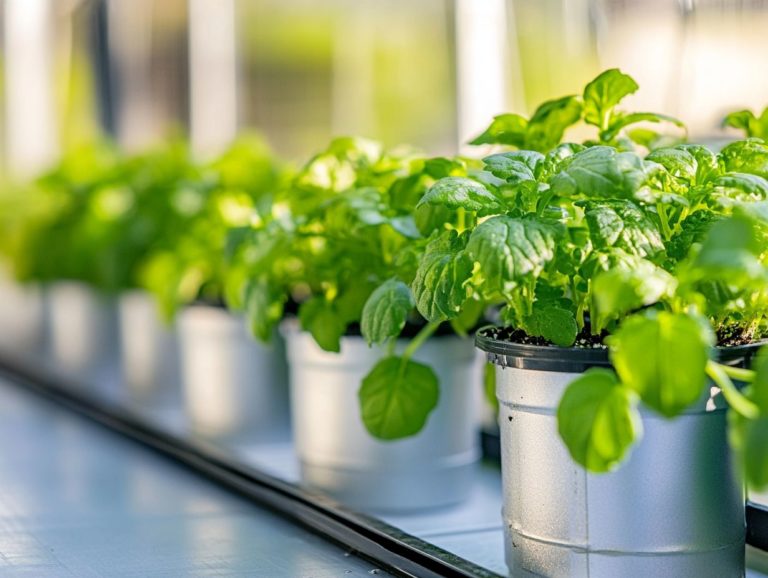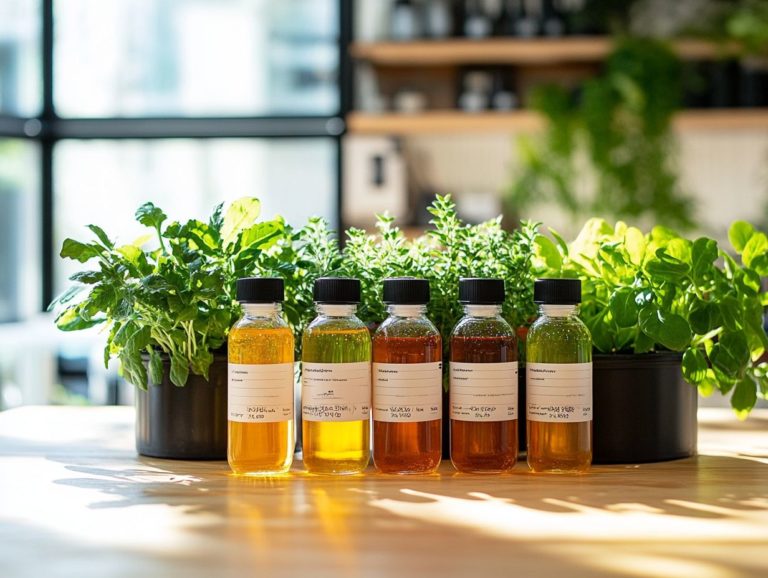5 Common Nutrient Myths in Hydroponics
In the realm of hydroponics, grasping the intricacies of nutrients is essential for nurturing vibrant plant growth. Misunderstandings are rampant, often leading you to make choices that could hinder your plants’ true potential.
This article unravels five prevalent myths surrounding nutrients in hydroponics, illustrating how a well-balanced nutrient profile can elevate your gardening experience. From the advantages of embracing organic nutrients to the pitfalls of overfeeding, you ll gain valuable insights to optimize your hydroponic system for flourishing plants.
Dive in now to discover these game-changing insights and supercharge your hydroponic gardening!
Contents
- Key Takeaways:
- 1. More Nutrients Means Better Plant Growth
- 2. Organic Nutrients Are Always Better
- 3. Nutrient Deficiencies Can Be Solved by Adding More Nutrients
- 4. Plants Can Thrive on Nutrients Alone
- 5. Nutrient Levels Should Remain Consistent Throughout the Growing Cycle
- Understanding Nutrients and Their Importance in Hydroponics
- Frequently Asked Questions
Key Takeaways:
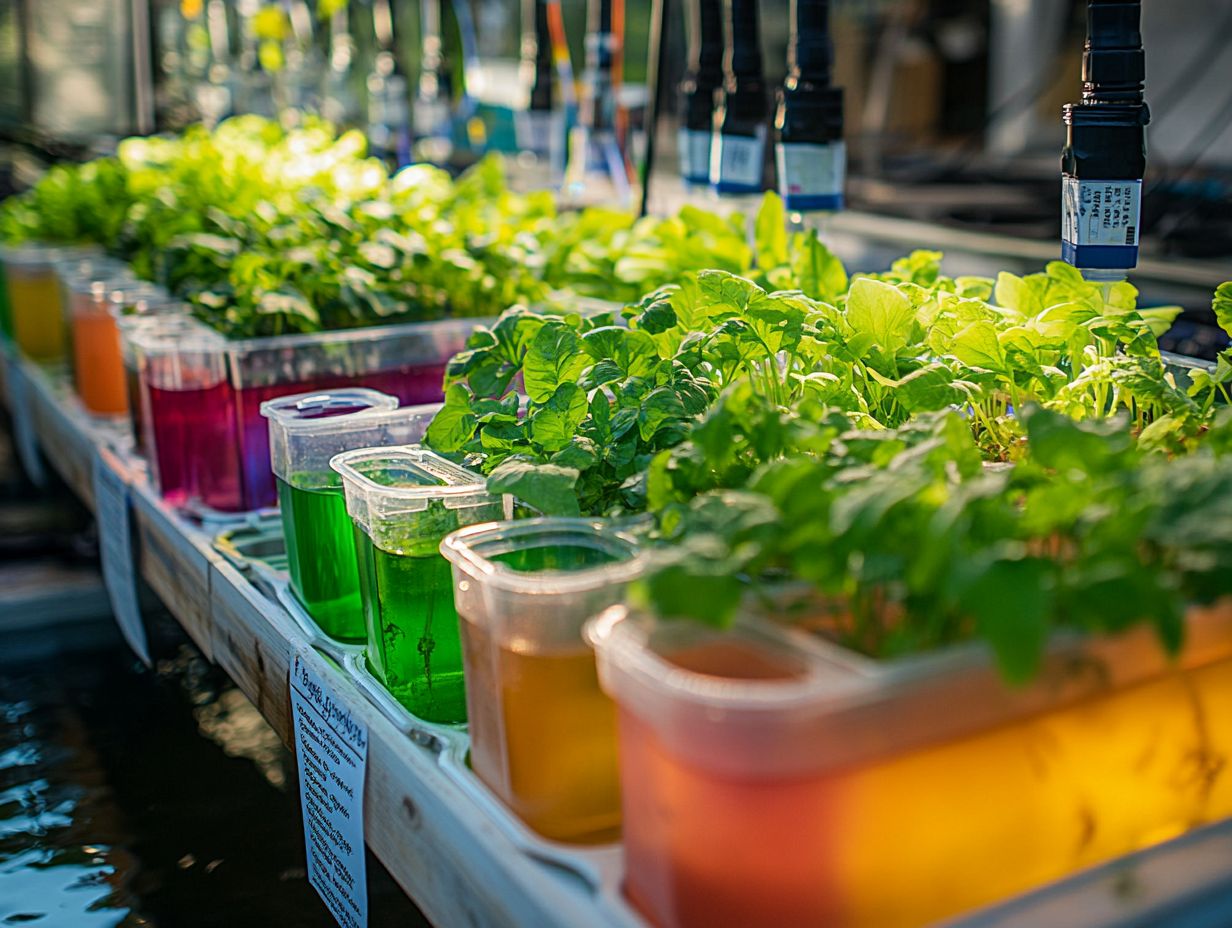
- Simply adding more nutrients isn t the key to better growth.
- Organic nutrients aren t always the best choice for hydroponically grown plants.
- Adding more nutrients won t necessarily fix nutrient deficiencies in plants.
1. More Nutrients Means Better Plant Growth
In hydroponic gardening, it s crucial to understand that more nutrients often do not lead to better plant growth. The right nutrient solution can dramatically boost the health and yield of your plants in controlled environments, paving the way for a sustainable approach to agriculture.
With hydroponic systems, you can precisely manage nutrient levels. This effectively mitigates deficiencies and fosters robust growth, ultimately resulting in healthier vegetables and fruits.
Essential minerals like nitrogen, phosphorus, and potassium are important for photosynthesis, root development, and overall plant metabolism. For example, nitrogen is critical for leafy greens, while phosphorus plays a vital role in flower and fruit production.
If you’re exploring vertical farming practices, consider techniques like nutrient film technique (NFT), where a thin film of nutrient solution flows over plant roots, or deep water culture (DWC), which involves plants growing in a nutrient-rich water solution. Even as a home gardener, you can adopt these practices on a smaller scale with vertical tower gardens or DIY hydroponic setups, ensuring that your plants receive optimal nutrients.
By mastering nutrient management, you can enhance plant health and contribute to the broader goal of sustainable food systems.
2. Organic Nutrients Are Always Better
In hydroponic gardening, choosing organic nutrients has emerged as a premier practice. These natural options deliver essential plant food free from synthetic additives and foster a healthier growing environment, aligning perfectly with sustainable agriculture principles.
Organic hydroponic fertilizers comprise a diverse mix of natural ingredients like compost, seaweed, and fish emulsion. These significantly enhance soil health and boost microbial activity. These nutrients promote vigorous plant growth and elevate flavor profiles. For instance, you ll likely notice that tomatoes and leafy greens exhibit remarkable improvements in taste and nutritional content when grown with organic amendments.
These organic solutions also help prevent chemical build-up in your system, making them an ecologically sound choice for gardeners dedicated to cultivating healthier crops.
3. Nutrient Deficiencies Can Be Solved by Adding More Nutrients
Nutrient deficiencies in hydroponic systems can be effectively addressed by supplementing the nutrient solution. This underscores the necessity of regularly monitoring and adjusting pH levels and electrical conductivity (EC) to optimize plant health and growth.
To identify these deficiencies, watch for common signs such as yellowing leaves or stunted growth, which often signal a lack of essential elements like nitrogen, magnesium, or potassium. By utilizing pH meters, you can accurately assess the acidity or alkalinity of your nutrient solution, ensuring that your plants can absorb these critical nutrients efficiently.
A well-balanced nutrient solution is essential as it promotes vigorous growth and reduces the risk of nutrient lockout, where plants struggle to utilize available nutrients effectively. To learn how to prevent nutrient deficiencies in hydroponics, addressing deficiencies promptly and accurately paves the way for healthier plants and, ultimately, a more bountiful harvest.
4. Plants Can Thrive on Nutrients Alone
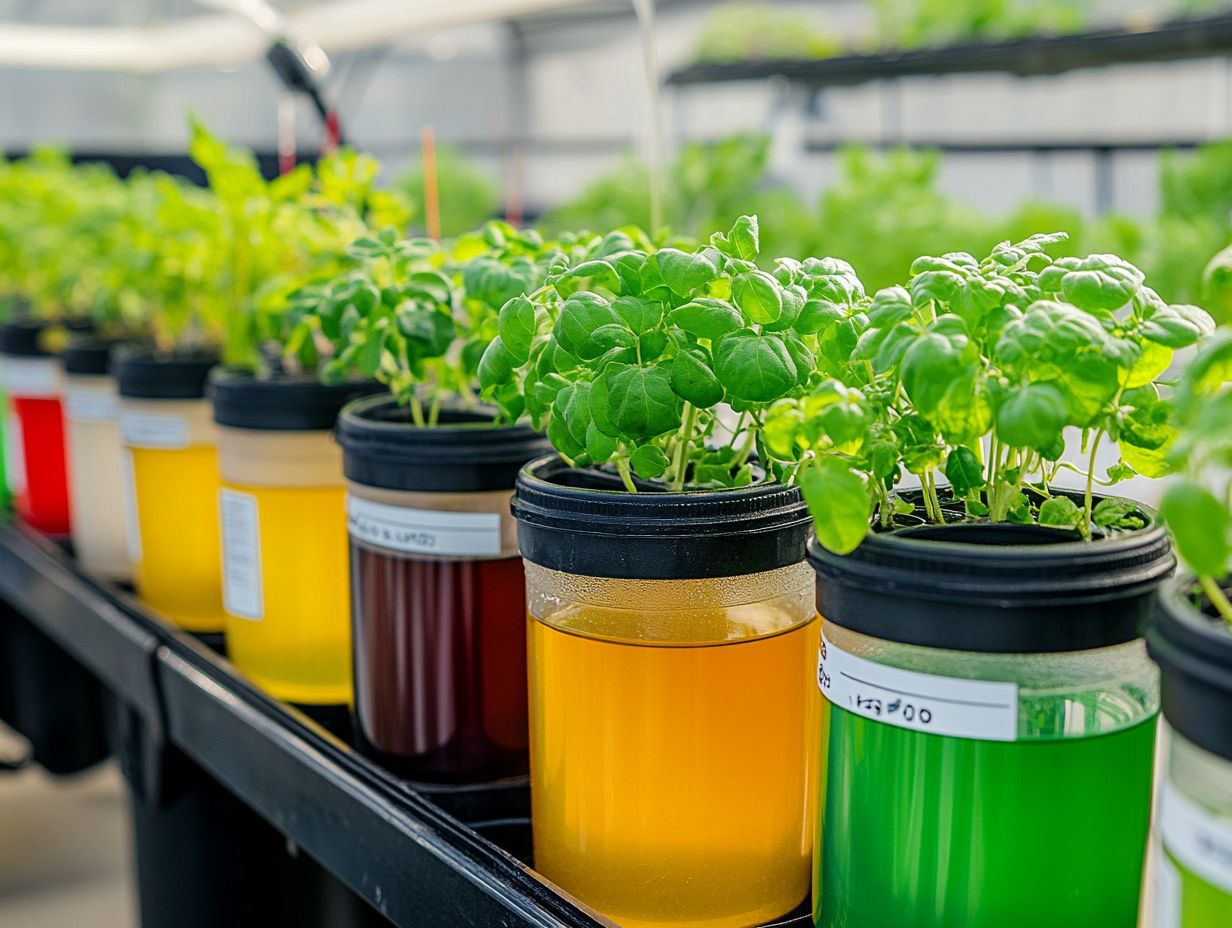
While traditional gardening relies heavily on soil, hydroponics reveals the remarkable truth that plants can thrive solely on nutrients. This method highlights the immense potential for sustainable agriculture, especially in urban environments.
With hydroponics, you gain precise control over the essential elements necessary for growth, including nitrogen, phosphorus, and potassium, all of which are dissolved in water to create a perfectly balanced environment. To enhance your understanding of nutrient solutions, check out the 5 popular hydroponic nutrient brands reviewed. You can customize these nutrient solutions to cater to the unique needs of each plant, ensuring optimal health and impressive yields.
For example, leafy greens like lettuce and spinach often flourish in hydroponic systems, reaching maturity faster than their soil-grown counterparts. Similarly, herbs such as basil and mint thrive in this nutrient-rich environment, growing vibrant and aromatic. Hydroponics is changing the face of modern agriculture, one plant at a time!
5. Nutrient Levels Should Remain Consistent Throughout the Growing Cycle
Maintaining consistent nutrient levels throughout your growing cycle is crucial in hydroponic gardening. Too little or too much of the needed nutrients can significantly affect your plants health and yield. The onus is on you to regularly monitor these levels using essential tools like pH meters and EC (electrical conductivity) meters, which measure nutrient concentration in the water.
These instruments provide immediate insights into the composition of your nutrient solution, enabling you to make timely adjustments. Here are some best practices to follow:
- Routinely calibrating your meters to ensure accuracy.
- Frequently testing the nutrient solution, ideally on a weekly basis.
It s also vital to keep your system clean by regularly flushing reservoirs and replacing nutrient solutions to prevent the buildup of undesirable salts or pathogens. By implementing these measures, you can create an optimal environment that fosters robust plant growth.
Understanding Nutrients and Their Importance in Hydroponics
Nutrients are essential building blocks in hydroponics, providing what your plants need to thrive. They play a critical role in various physiological processes, addressing food insecurity through innovative growing methods that maximize yield and efficiency in limited spaces.
You can categorize these nutrients into macronutrients, such as nitrogen, phosphorus, and potassium. Each of these plays a vital role: nitrogen is key for energy transfer, phosphorus is essential for photosynthesis, and potassium supports root development. Don’t overlook the micronutrients like iron, zinc, and manganese. Though needed in smaller quantities, they are equally crucial for enzymatic functions and the overall health of your plants. For those interested in optimizing their hydroponic systems, consider these 5 nutrient tips for hydroponic fruit production.
Effective nutrient management is your ticket to ensuring these vital components are available in the right proportions, boosting plant vigor and productivity. By optimizing your nutrient solutions and following 5 must-know nutrient tips for hydroponics, hydroponic systems can yield high-quality produce, contributing to sustainable agriculture and helping to tackle food insecurity, especially in urban areas where arable land is in short supply.
What Are the Essential Nutrients for Plant Growth?
Essential nutrients for plant growth in hydroponics can be divided into macronutrients and micronutrients, each playing a crucial role in various physiological functions that ensure your plants thrive.
Macronutrients, such as nitrogen, phosphorus, and potassium, are foundational for processes like photosynthesis, root development, and the overall energy transfer within the plant. Meanwhile, micronutrients like zinc, iron, and manganese, although required in smaller quantities, are just as vital; they support enzyme functions and chlorophyll production.
In your hydroponic system, these nutrients interact synergistically within the nutrient solution, enhancing plant uptake and fostering growth. By understanding their roles and striking the right balance, you can create an ideal growth environment. For more insights, check out this guide on how to avoid nutrient imbalance in hydroponics that leads to bountiful harvests and robust plant health.
How Do Nutrients Affect Plant Growth in Hydroponics?
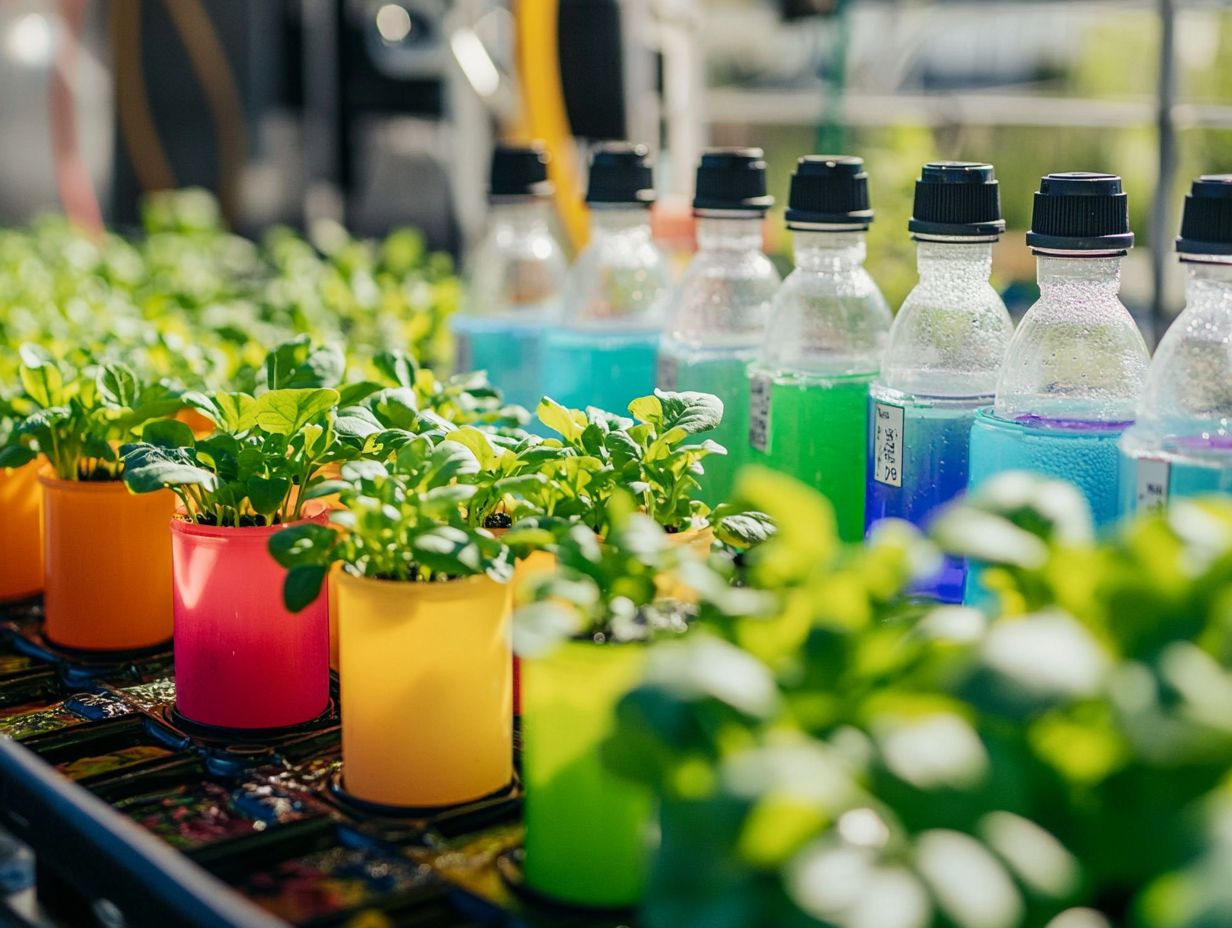
In hydroponics, nutrients play a crucial role in plant growth. They influence key processes like photosynthesis, respiration, and nutrient uptake, determining the overall health and productivity of your plants.
Think of these nutrients as essential building blocks for cells and enzymes that help the plant perform vital functions. Their effectiveness depends not only on their availability but also on their interaction with environmental factors like light and temperature.
Adequate light stimulates photosynthesis, allowing plants to convert nutrients into energy efficiently. Meanwhile, maintaining the right temperature enhances metabolic rates, improving nutrient uptake and utilization.
This intricate balance between nutrients and environmental factors highlights the complexity of achieving optimal plant health in hydroponic systems.
What Are the Consequences of Overfeeding Plants in Hydroponics?
Overfeeding plants in hydroponics can lead to significant issues, such as too many nutrients causing plant damage, imbalanced pH levels, and even nutrient shortages. This emphasizes the need for precise management of your nutrient solution.
When nutrient concentrations exceed what your plants require, you may see signs like browning leaf edges, stunted growth, or wilting. These symptoms create stress for your plants. While nutrients are essential for healthy growth, too much can disrupt the delicate balance necessary for their well-being.
Want to fix overfeeding problems? Try these steps:
- Flush the system with clean water to dilute excess nutrients.
- Adjust your feeding schedules.
- Regularly monitor pH and nutrient concentration.
Finding the right balance will help you cultivate healthier plants and create a thriving hydroponic environment. For more insights, check out the myths and facts explained about hydroponic systems.
How Can One Determine the Right Nutrient Levels for Their Plants?
Determining the appropriate nutrient levels for your plants in hydroponics requires regular monitoring using tools like pH meters and conductivity meters. These instruments help you fine-tune your nutrient solution for optimal plant health and growth.
By consistently checking the pH and nutrient concentration, you can ensure that your plants receive the right balance of minerals needed for their growth stages. It’s essential to recognize that different plants have varying nutrient needs, which change as they progress from seedling to flowering stages. For hydroponic gardening, understanding the 5 essential nutrients for hydroponic roots is crucial.
Keeping a close eye on these parameters helps you avoid deficiencies or toxicities, fostering strong growth and maximizing yields in your hydroponic system.
What Are Some Common Misconceptions About Nutrients in Hydroponics?
Common misconceptions about nutrients in hydroponics often stem from misunderstandings of how nutrient solutions work. These misunderstandings can lead to errors that hinder sustainable agriculture practices.
Many people mistakenly believe that more nutrients automatically lead to better growth. This can result in over-fertilization and nutrient lockout, which can harm plants. Relying on the same nutrient mix for every plant may seem easier, but it ignores the specific needs that vary by species and growth stage. To avoid common pitfalls, be aware of the top 10 nutrient mistakes in hydroponic gardening.
To enhance your hydroponic skills, it’s crucial to learn about optimal nutrient balances. Regularly monitoring solution pH and nutrient concentration can significantly improve plant health.
Frequently Asked Questions
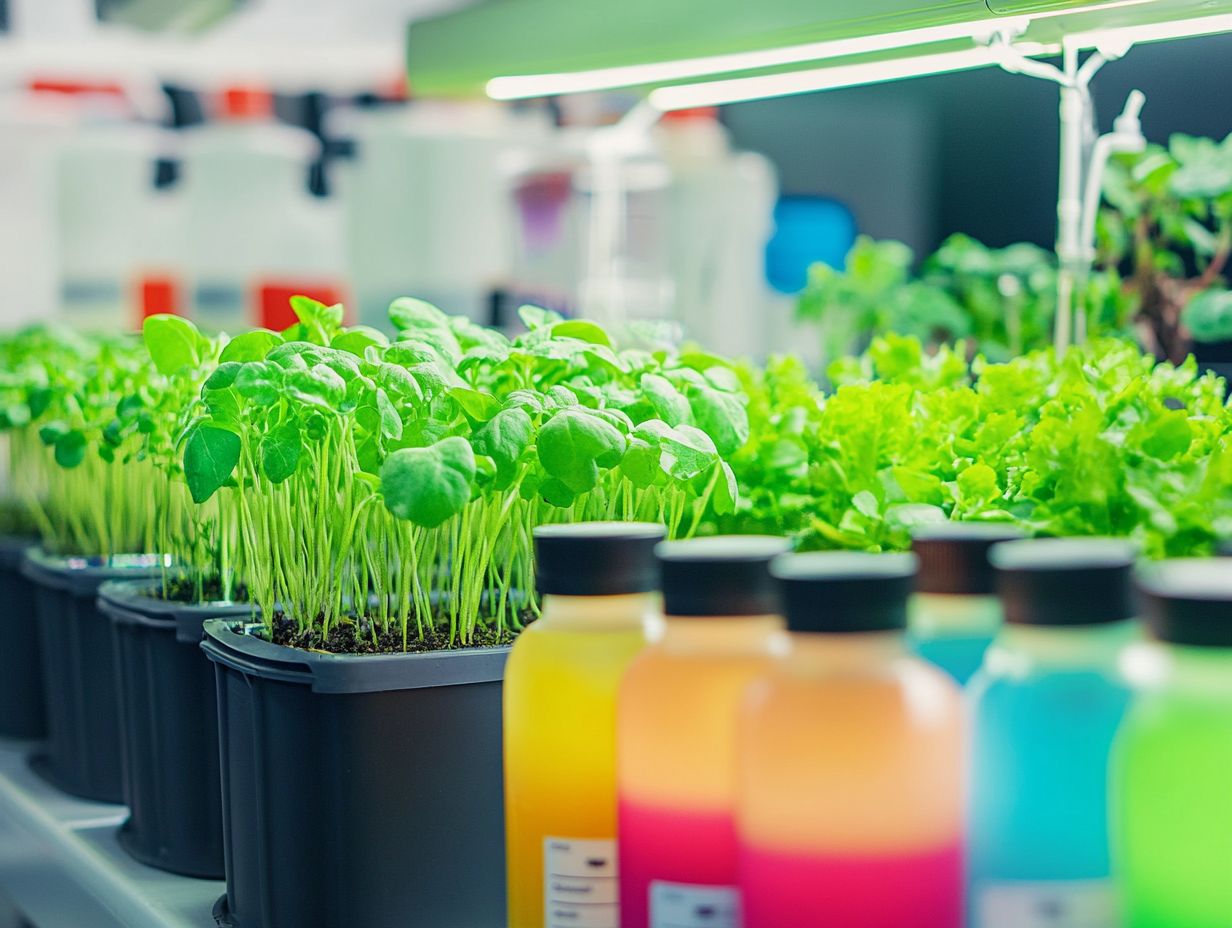
Start monitoring your plants today for thriving results!
What are the 5 common nutrient myths in hydroponics?
Here are five common myths about nutrients in hydroponics:
- Nutrients are unnecessary.
- All plants need the same nutrients.
- Organic nutrients are superior to synthetic ones.
- More nutrients lead to better growth.
- Nutrient deficiency is easily fixed by adding more nutrients.
Are nutrients necessary in hydroponics?
Yes, nutrients are essential for hydroponic plants, just like they are for any other plants. Even though the sources may differ, nutrients are critical for growth.
Do all hydroponic plants need the same nutrients?
No, each plant has its unique nutrient needs. Researching these requirements is crucial for the health of your hydroponic system.
Are organic nutrients better than synthetic ones?
Not necessarily. Both organic and synthetic nutrients can support plant growth. It depends on the specific plants you are growing and your personal preferences.
Does more nutrients equal better growth?
No, overloading your plants with nutrients can cause damage. Stick to recommended levels and monitor them regularly.
Can you easily fix nutrient deficiency by adding more nutrients?
This misconception can lead to problems. While adding nutrients may provide a quick fix, understanding the root cause is vital for long-term health.
